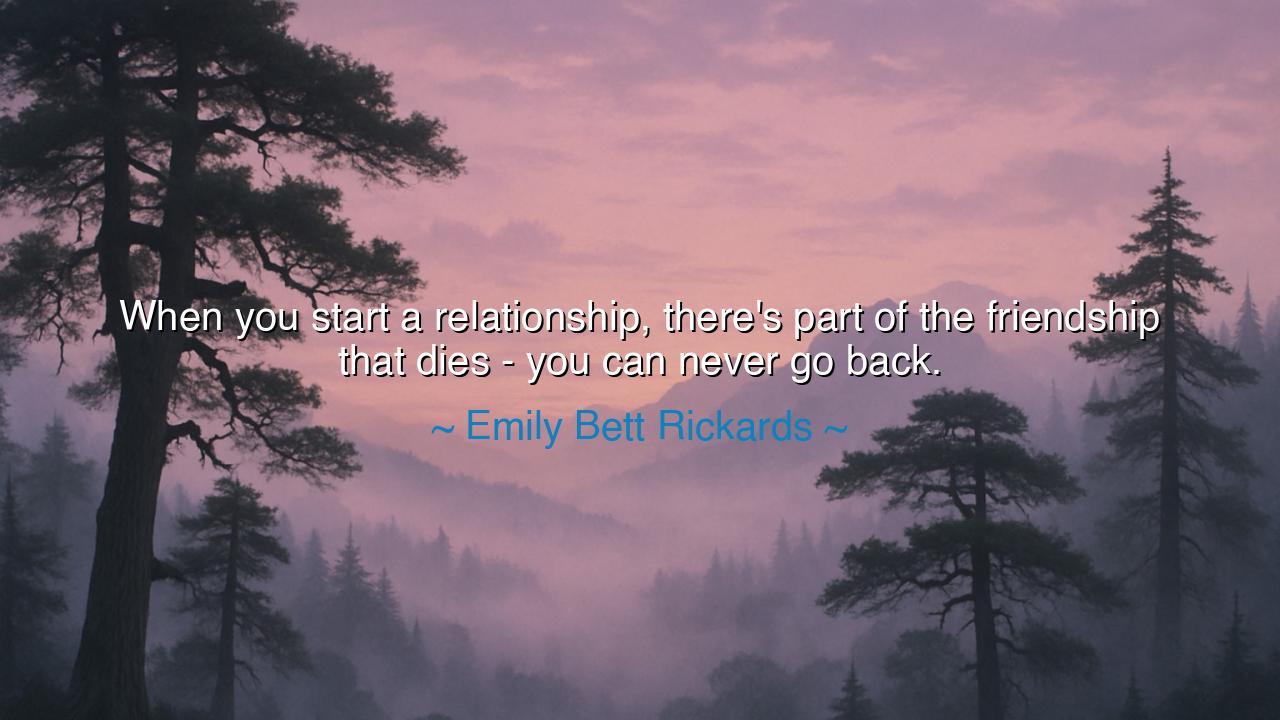
When you start a relationship, there's part of the friendship
When you start a relationship, there's part of the friendship that dies - you can never go back.






In the sacred tapestry of life, the relationships we weave are among the most delicate and complex threads. Each bond we form—whether it be of friendship, love, or kinship—marks the beginning of a journey that is as transformative as it is irreversible. Emily Bett Rickards, in her profound reflection, speaks of the quiet sorrow that comes with the shift of a friendship into something more. She says, "When you start a relationship, there's part of the friendship that dies - you can never go back." These words carry the weight of ancient wisdom, for they speak to the truth of all relationships—that when we cross a certain threshold, we cannot return to the innocent simplicity of what once was.
To understand this truth, we must first recognize the profound nature of friendship. In the ancient world, friendships were seen not as casual bonds but as sacred pacts—covenants that were forged in the fires of shared experience and mutual respect. Achilles and Patroclus, whose bond was stronger than any simple companionship, shared a love that transcended the conventional. Yet, when that friendship crossed into the realm of war, their connection was forever altered. The carefree days of shared laughter were replaced by the grave consequences of conflict. Such is the nature of change in any deep bond. The moment a relationship evolves, it is as though the old self is left behind, and in its place, something new, something more complex, emerges.
When Rickards speaks of a part of friendship dying, she is acknowledging the inevitable transformation that comes with deepening emotions. To cross from friendship into a romantic relationship, for instance, is not merely a change in the title of the connection, but a profound shift in the way two souls relate to one another. The boundaries that once defined the bond, the innocent joy of uncomplicated companionship, are suddenly clouded by the expectations and emotions of something greater. The purity of friendship—where no expectation, no longing, no fear existed—becomes tinged with the complexities of desire, vulnerability, and commitment. Once this threshold is crossed, there is no return to the simplicity of what once was.
This truth echoes through history. Rome’s greatest friendship, that of Julius Caesar and Pompey, was once a bond that seemed unbreakable, a friendship built on mutual respect and shared goals. Yet, when the winds of ambition and politics shifted, their relationship was irrevocably altered. Once allies, they became adversaries, and the shared trust they once held was buried under the weight of betrayal and rivalry. This ancient tale is a reminder that friendships—like all things—are subject to the forces of time, ambition, and change. Once the path of conflict is taken, the foundation of that bond can never be the same.
The lesson that Rickards imparts to us is one of awareness—an understanding that no relationship exists in a vacuum. The transition from friendship to something more is not something to be taken lightly, for it carries with it the potential for both growth and loss. To love someone is to accept the complexities of their being, to enter into a shared world that requires compromise, vulnerability, and the shedding of old selves. In the ancient texts, we are reminded that growth is always a process of transformation, and transformation often comes with the painful realization that we can never return to what we once were.
In our own lives, we must approach the changing tides of relationships with great care and honesty. Cherish your friendships as sacred, but also recognize that if you seek to deepen them, there will be moments when the simplicity of the past is forever lost. In these moments, the true test of wisdom lies in accepting that transformation is both inevitable and necessary for growth. To hold onto the past too tightly may prevent the flourishing of the future, but to embrace change with an open heart requires courage.
Thus, we are taught that friendship and love are not static things; they are the living, breathing currents of our existence, shaping and reshaping us as we grow. There is a sacred beauty in these relationships, and in that beauty, we find the courage to face the inevitable changes they bring. Let us not fear the parts of friendship that die as we move forward, for in their place, something new is born—something deeper, something more true. Embrace the shift with grace, and let each relationship be a testament to your ability to evolve and grow, knowing that in the end, you will have created something far more meaningful than what came before.






AAdministratorAdministrator
Welcome, honored guests. Please leave a comment, we will respond soon